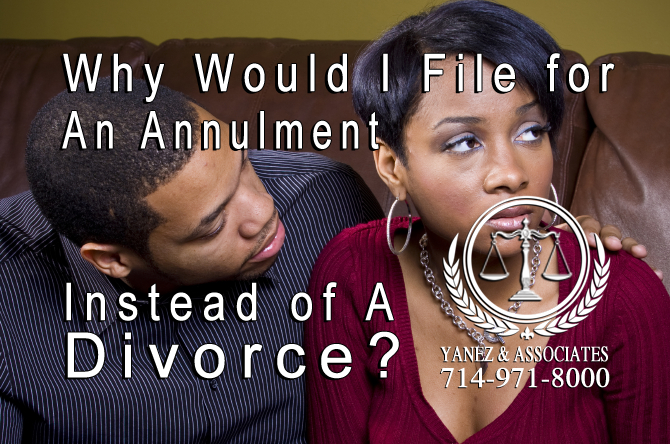Seeking an Annulment in Orange County and trying to find the best family law attorney?
When Looking for an Annulment in California Orange County, sometimes, you know that an annulment is the right step. Other times, you consider a divorce and then you find out that an annulment fits your situation better. Regardless how you ended up on this page, if you are considering an annulment, it’s a good idea to have as much information about annulments in California as possible.
In order to file for an annulment in California, you need to know what it is, you need to qualify for it, and you need to put your affairs in order so that your post-annulment life can be put together.
What is an Annulment?

What is an Annulment?: Incest, Bigamy, Underage, Missing Person/Prior Marriage, Unsound Mind, force and physical incapacity.
Basically, an annulment is a legal process that renders a marriage invalid, and changes it so that instead of ending the marriage, it is as if the marriage never legally happened. A marriage can be rendered invalid for several reasons.
Incest - Marriages and registered domestic partnership between close blood relatives are not valid, legal marriages.
Bigamy - If one spouse is married or in a registered domestic partnership at the time that the marriage or registered domestic partnership begins; the second marriage or domestic partnership is not valid.
Underage - If either party is under 18 at the time of the marriage or registration of the domestic partnership, the marriage may be annulled.
Missing Person/Prior Marriage - If one party is already in a marriage or registered domestic partnership, and abandons their former spouse or partner, the former spouse or partner may be eligible for a divorce on the grounds of abandonment. However, if the party who abandoned their marriage or registered domestic partnership attempts to remarry or register a new domestic partnership, it may be annulled.
Unsound Mind - If either party was considered to be “of unsound mind” at the time of the registered domestic partnership or the marriage, and was unable to understand what it meant to enter a marriage or registered domestic partnership, the union may be annulled.
Force - If either party was forced into the marriage or registered domestic partnership, it can be annulled.
Physical Incapacity - If either party was physically incapacitated at the time of the marriage or registered domestic partnership, or is unable to consummate the marriage or partnership, the marriage may be annulled.
If you meet one of the above-mentioned qualifications, you should discuss the option of an annulment with your family lawyer. If you want to get an annulment, you will need to work with your lawyer to prove that one of the above is true. Proving this can be one of the most difficult parts about getting an annulment, so it is always best to work with an attorney.
Why Would I File for An Annulment Instead of A Divorce?
There are several reasons why a person might choose to file for an annulment instead of a divorce. If any of the above reasons describe your situation, an annulment would allow the marriage to end, freeing both parties to marry or register a domestic partnership without some of the hassle of divorce.
For example, annulments do not allow for spousal support, and there is no division of property in an annulment. The parties will not split things like bank accounts, owned businesses, or retirement accounts.
Many people think that annulments are only for short marriages, or only for those that include very young people who may not be old enough for marriage, or who are obtaining an annulment for religious reasons. There are actually many reasons why a marriage may be declared invalid, and the length of your marriage does not play a role in whether or not you can file for an annulment, or whether an annulment is a better option for you than for a legal separation or a divorce.
How Long Do I Have to File For An Annulment?
The length of the marriage does not have any effect on whether you qualify for an annulment, but it may make it more or less difficult to prove that you are eligible for an annulment. However, there is a deadline for filing for an annulment, called a statute of limitations. (There is no statute of limitations for divorces or for legal separations.)
The statute of limitations depends on the reason listed above that renders you eligible for an annulment.
Underage - If you choose to file an annulment because one party is underage at the time that the parties entered the marriage or registered domestic partnership, there are two statutes of limitations, depending on who files for the annulment.
• The underage person has four years after they turn 18 to file, and
• A parent or guardian of the underage person has until the minor’s 18th birthday to file.
Missing Person/Prior Marriage - If you choose to file because one person has abandoned a previous marriage or registered domestic partnership without filing for a divorce or legal separation, either party to the new marriage or registered domestic partnership may file as long as both parties are alive, and the former spouse or partner may file at any time.
Unsound Mind - As long as both parties are alive, the partner or spouse of the person who is of unsound mind may file. The same stipulation applies for any family member or conservator who files on behalf of the person who is of unsound mind.
Fraud - The person who was deceived may file for an annulment within four years of learning of the fraud.
Force - The person who was forced into the marriage or registered domestic partnership may file within four years of marrying or registering the domestic partnership.
Physical Incapacity - The person who is married or in a partnership with a physically incapacitated person may file for annulment within four years of marrying or registering the domestic partnership.
If you are not sure whether you have time to file, it is best to speak with an attorney as soon as possible.
What Happens After My Annulment is Finalized?

Like a divorce, an annulment allows both parties to enter a new marriage or registered domestic partnership. However, unlike a divorce, it does not end a valid marriage, but it eliminates the marriage by declaring it invalid, and legally erasing it.
When a marriage does not exist, it means that the parties do not have community property. Therefore, their property and debt will not be divided. Things like retirement funds, bank accounts, property, businesses, and debts will need to be divided by the parties involved in the annulment, or they will simply go back to the person to whom they first belonged, or the person in whose name they are.
There can be no spousal support for a marriage that did not exist either, so both parties must be okay with foregoing spousal support.
Child custody and visitation will be treated as though the child’s parents are unmarried. Therefore, before a custody or visitation agreement can be created, paternity must be established. Following the annulment, or during the process of obtaining an annulment, the parties can apply for a custody and visitation case where a custody and visitation order will be made. The same applies for child support - once paternity has been established, the parties can request a child support order as if the child’s parents are not, or were never married.
What If the Court Denies My Annulment Request?
This may be because one party was not able to prove that your marriage or registered domestic partnership is eligible for an annulment. If so, you may file an amended petition with the court so that you apply for a legal separation or a divorce instead.
Remember that you will need to meet the residency requirements, and you may need to file for a legal separation prior to filing for a divorce. At this point, you would no longer need to follow any regulations regarding annulments.
I want to file for an Annulment in OC California; therefore, it's time to contact the Orange County Divorce and Annulment Attorneys
If you are considering an annulment, or if you have questions about whether you qualify for an annulment or not, it is always best to discuss your options and questions with a qualified attorney. An attorney will be able to understand your situation, and help you decide whether you are eligible for an annulment.
At Yanez & Associates, we offer free initial consultations, and we are here to help. Contact us today to schedule your free initial consultation.













